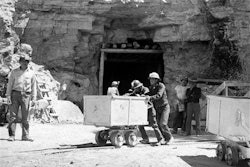WASHINGTON (AP) -- A bid by supporters of the proposed Keystone XL oil pipeline to force a vote on the controversial project fell apart Wednesday amid partisan bickering over how the vote should be conducted.
Senate Majority Leader Harry Reid, D-Nev., used a parliamentary maneuver to block a bid by pipeline supporters to include the pipeline measure in an energy efficiency bill moving forward in the Senate. Republicans also were seeking an amendment to prevent the Environmental Protection Agency from imposing new greenhouse gas regulations on coal-burning power plants.
Reid's actions came after Senate Republican leader Mitch McConnell objected to Reid's offer to call an up-or-down vote on the energy bill, with a promise for a separate vote on Keystone later.
The partisan wrangling threatened to doom prospects for both the energy efficiency bill and the pipeline measure, which would authorize immediate construction of the proposed pipeline from Canada to the United States. Supporters say the measure is needed to end years of delay by the Obama administration on whether to approve the project.
Reid called the standoff a "shame," but said Republicans had only themselves to blame. "Senate Republicans keep changing their requests," he said.
McConnell, R-Ky., said Reid was stifling the voice of the American people by refusing to allow amendments to the energy bill.
"Even if Senate Democrats would rather pander to the far left and shut down debate, Republicans are going to keep fighting for the middle class," McConnell said.
Sen. Lisa Murkowski, R-Alaska, called the partisan standoff ridiculous.
"It stuns me that we have gotten into such a mess," she told reporters. "We can't even get an energy efficiency bill that everyone likes through the Senate floor."
The Keystone XL pipeline would cross Montana, South Dakota, and Nebraska, where it would connect with existing pipelines to reach refineries on the Texas Gulf Coast. The Obama administration announced last month it was delaying a decision on the pipeline's fate indefinitely.
All 45 Senate Republicans and as many as a dozen Democrats support a bill that would force a decision on the project. Sixty votes would be needed to approve a stand-alone bill on Keystone.
Supporters say the pipeline will create thousands of jobs and aid energy independence, but environmentalists warn of possible spills and say the pipeline will carry "dirty" tar sands oil that contributes to global warming.
Sen. John Hoeven, a North Dakota Republican who co-sponsored the Keystone bill, said he was disappointed at the apparent impasse. But he and other pipeline supporters vowed to keep working toward an agreement before an expected vote Monday on a procedural motion allowing the energy efficiency bill to go forward.
Hoeven said he doubts Republicans will support the bill unless they are allowed to offer amendments. "I don't think there's enough votes on energy efficiency if we can't work out amendments," he said.
If the energy efficiency bill fails, a vote on Keystone is unlikely, Democrats said.
Hoeven said he was willing to push for a stand-alone vote on Keystone, but said, "My caucus is going to have to get some amendments (to the energy bill) to agree to a deal like that."
Sen. Mary Landrieu, D-La., who has pushed for Keystone approval as a key part of her re-election campaign, expressed frustration that the Senate appeared likely to miss opportunities for both the energy efficiency bill and the pipeline measure. Still, she said she would work with Hoeven and others to get an agreement.
"It's going to take cooperation. It's going to take a little give-and-take, and I guess that's too much to ask," she said. "And that is sad."






















